What to choose a countertop for the kitchen?
In order for the product to serve for a long time and look attractive, it is better to immediately take into account several points:
- Cost, which consists of the size, shape and type of product.
- Compatibility with other elements of the kitchen: facades, an apron, a dining group. You can read more about choosing successful color schemes. in this article.
- Coating Care Rules. The surface must withstand the effects of various detergents.
- Features of the material used in the manufacture of countertops.
In more detail about chipboard worktops, see this video:
An overview of products from other popular materials can be found here:
Types and characteristics of kitchen worktops
Most often, separation occurs according to the material used in the production. Consider the features of various types of countertops and identify their advantages and disadvantages.
Chipboard / chipboard
This material is most common in the economical segment of kitchen furniture. Due to the technology of postforming (coating wood-particle boards with paper-laminated plastic using pressure and high temperature), this kitchen worktop acquires wear resistance and impact resistance.
| Advantages | disadvantages |
|---|---|
| Low price and ease of installation. | It is impossible to make a solid corner worktop: you must use silicone sealant and metal strips to join the plates. |
| Heat resistance (but for safety, it is recommended to use hot stands). | If the ends are covered with cheap pvc-film, poor-quality plastic may peel off and an entire plate needs to be replaced. |
| The laminated surface is practically not afraid of moisture. | Instability to aggressive cleaners and dyes. |
| Thanks to the decorative layer, any pattern can be applied. | Formaldehyde emitting resins are used in the production. |
The photo shows a budget but stylish kitchen with a sink and stove built into the countertop.
MDF
Products from this material differ from chipboard only in their base: the plate consists of denser and finer wood chips, and it is also laminated with plastic under high pressure.
| Advantages | disadvantages |
|---|---|
| Low price. | With careless handling and poor care, it loses its original appearance. |
| Large selection of colors: you can simulate any surface. | It has low impact resistance. |
| Compared to particleboard, the moisture resistance is much higher. | In unprotected places (most often it is an end face) it can be deformed from water. |
| Chemical resins harmful to the body are not used in production. |
Acrylic
Also called artificial or bulk stone. The countertop consists of white clay and binders: acrylic and polymer resins. It is usually made to order, because it is a cast plate without joints, which can be given any shape: straight, angular or non-standard rounded.
| Advantages | disadvantages |
|---|---|
| A wide selection of designs. | Scratches easily form on the countertop, which are especially noticeable on products of dark colors. |
| Easy to clean: just wipe the acrylic with a damp cloth and soapy water. | The surface is unstable to high temperatures, so you should always use stands. |
| Durability, strength, moisture resistance. If the surface is damaged, it is not necessary to change the entire plate: the defect is corrected by grinding. |
The photo shows an unusual kitchen with a polished radius countertop made of bulk stone.
Quartz
A product made of quartz agglomerate can be called environmentally friendly, since it contains 96% of natural quartz, and the remaining 4% are epoxies and dyes. The finished stove can have any shape and color.
| Advantages | disadvantages |
|---|---|
| The anti-vandal surface is not scratched, it is not afraid of strong blows. | High price. |
| Absolutely not subject to moisture and high temperatures. | Complex installation: heavy-duty material requires skills and special equipment. |
| A sink made of the same material is practical and gives the design of the kitchen uniformity. | Cold touch surface. |
In the photo there is a kitchen with a long quartz countertop located along the window.
Granite
The basis of the product is natural granite: a luxurious option for connoisseurs of classics.
| Advantages | disadvantages |
|---|---|
| Excellent wear resistance, decades of service. | The high cost of the product. |
| The material is absolutely fireproof. | The choice of colors is very limited. |
| Resistance to moisture and microorganisms, the surface is easy to care for. | The granite countertop for the kitchen has a solid weight. |
| The pattern is always unique. | A product longer than 2.5 m long consists of several plates, and therefore has joints. |
Travertine
This is a natural finishing stone, reminiscent of limestone and marble. The monolithic countertop for the kitchen from travertine looks beautiful and soundly, featuring a wide variety of textures and colors.
| Advantages | disadvantages |
|---|---|
| Affordable price. | The tendency to rapid abrasion, which is eliminated by surface treatment with special protective resins. |
| Resistant to high temperatures, not exposed to moisture. | |
| It does not change its appearance during operation, and is not afraid of household chemicals. | The choice of colors is limited. |
| It has voids inside, so the weight of travertine countertops is less than that of other natural stone. |
Wooden
Connoisseurs of natural wood can choose a countertop for the kitchen from solid wood. In its production, high-strength breeds are used: walnut, oak, ash, bamboo. A furniture panel will become a budget option: since wooden lamellas are glued and pressed, the moisture resistance and wear resistance of such a material are higher. An original solution for the kitchen is a product made of slab - a longitudinal wooden saw with raw edges.
| Advantages | disadvantages |
|---|---|
| Average cost compared to other natural materials. | The use of hot coasters is mandatory. |
| Pleasant tactile sensations, natural unique pattern. | Unprotected surfaces can become deformed by moisture. |
| Protective varnished surface is not afraid of moisture. | Instability to dyes and cleaners. |
Tile
Decorative tabletop made of ceramic tiles looks original and attracts attention. For decoration, tiles of small sizes (10x10 cm) or mosaic are usually used. Traditionally, dark grout is used for seams: pollution is less noticeable on it.
| Advantages | disadvantages |
|---|---|
| Strength, practicality, durability and wear resistance. | Seams require special attention, because in the kitchen they often accumulate food debris. |
| High hygroscopicity, steam and moisture resistance. | |
| Resistance to various mechanical influences and temperature changes. | At the edges of the countertops during operation, chips may appear. |
| Easy and easy care. |
Marble
A natural marble countertop looks more aristocratic and refined than granite, but has several significant disadvantages:
| Advantages | disadvantages |
|---|---|
| It looks solid and reliable. | High price. |
| It has a unique noble pattern. | Moody in leaving, easily absorbs stains due to the porosity of the material. |
| It is prone to scratches and chips, has low heat resistance. |
In the photo there is a marble countertop, which is favorably emphasized by the emerald-colored set and accessories with a golden patina.
Metal
Stainless steel is universally used as a work surface in catering establishments. Its use in the home kitchen is due, rather, to the style preferences of the owner, rather than practicality.
| Advantages | disadvantages |
|---|---|
| Resistance to any liquids, moisture, household chemicals, dyes. | High price. |
| Durability and durability. | Drops and stains are clearly visible on the metal surface. |
| Easy to clean: any dirt is easily eliminated. | Stainless steel is not suitable for all styles, as it is associated with catering. |
In the photo there is a kitchen with a metal worktop that fits perfectly into the hi-tech high-tech style, having in common with chrome elements, built-in lighting and a mirror apron.
Plastic
A plastic worktop is an inexpensive analogue of artificial stone.
| Advantages | disadvantages |
|---|---|
| Low price. | Exposed to high temperatures. |
| It can imitate any texture - wood, stone, concrete - both in appearance and by touch. | |
| Shockproof material. | Low wear resistance. |
Concrete
The kitchen worktop from interior concrete is gaining its popularity due to the practicality of the material: it combines the positive characteristics of natural stone and low cost. Moreover, if desired, the plate can be made independently, decorating it with decorative impregnations: multi-colored pigment, broken glass, beads, coins.
| Advantages | disadvantages |
|---|---|
| The durable surface is not afraid of mechanical damage. | Complicated installation. |
| Thermal and moisture resistance. | High weight requiring a reinforced base. |
| The uniqueness of the design. | If you do not protect the porous surface with polymers, it absorbs all impurities. |
Glass
Spectacular transparent worktop made of tempered glass will decorate the interior of the kitchen and fit into any environment. In modern design, this material is in demand due to the variety of processing technologies: tinting, imitation of stone or metal, photo printing. Another successful design option is to install plexiglass on top of a wood worktop.
| Advantages | disadvantages |
|---|---|
| Not afraid of temperature changes, grease and chemical cleaners. | Fragile structure: in case of damage, replacement of the entire canvas is required. |
| Hygienic material that is easy to care for. | The high cost of the product. |
| Thanks to the reflective surface it does not overload the kitchen space, adds lightness and "air". | Glass is quite easily soiled, requires constant care. |
Tips for choosing the size of the countertop: length, width, thickness, height from the floor
Before calculating the amount of material, it is necessary to draw up a competent drawing taking into account the dimensions of the kitchen.
- The length of the product directly depends on the desired project and the area of the room: whether it is a straight countertop along the wall, angular, passing into a bar, or even semicircular. Its sizes vary from 60 cm to 6 m.
- The standard width of the stove, which fits in both spacious and narrow kitchens is 60 cm, but the housewives note that in convenience the working surface 90 cm wide wins significantly. In exceptional cases, its dimensions can reach 140 cm.
- The most popular product thickness: 28 and 36 mm. But there are also thin kitchen worktops made of ceramics, stone or frosted glass with a thickness of only 20 mm, as well as solid plates up to 56 mm.
- At what height to position the working surface depends on household growth, but there are general recommendations: the countertop is convenient if it is located at the level of the belt or slightly lower, and there should be a distance of 45 to 60 cm between it and the wall cabinet.
Kitchen worktop design
Consider a few more original and practical ideas that designers offer.
Few people think of making a kitchen worktop thin: we are used to seeing it solid and reliable. But a minimalistic product, while it looks original, stylish and does not "press" on the stands, has the same practical properties as a thick countertop.
In the photo, the kitchen is in the style of minimalism with an ultra-thin work surface made of natural stone.
For lovers of natural materials, a thermal tree is suitable: a product obtained as a result of heat treatment of wood. Due to the prolonged exposure to high temperatures on the workpiece, the internal resins and wood fibers are compressed, which leads to increased wear resistance and strength.
In the photo there is a kitchen with a corner countertop made of thermal wood.
A tabletop made of custom acrylic can combine the kitchen set into a single composition: the work surface will echo with the island, bar counter or even a dining table.
In the photo, a curly worktop that creates a stylish monochrome composition.
Photo of kitchen worktops in the interior
Sometimes a kitchen worktop becomes a central element of the interior. This is especially true of expensive unique materials, the refinement of which I want to emphasize. To focus on the work surface, you can use:
- contrasting furniture;
- materials with opposite properties (for example, metal and wood);
- spot lighting.
The photo shows an original onyx countertop with contrasting lemon-colored chairs.
Sometimes a countertop does not even need to be additionally allocated - it becomes a highlight of the kitchen by itself due to its unique color, shape or composition:
In the photo, a product made of artificial stone under malachite.
Variants of countertops in various styles
A countertop is an element that helps maintain the chosen style, as it takes up a lot of space in the kitchen.
- White glossy acrylic plate will help to soften a rough loft and maintain emphasis on space and light.
- In the cozy kitchen, decorated in country style, the cabinets, lined with ceramic tiles, will perfectly fit.
- The Scandinavian style is characterized by an abundance of light colors and a love of natural material, so wooden or granite countertops are a frequent guest here.
- Classics that gravitate towards luxury are distinguished by extremely expensive materials, which means quartz, marble and granite are ideal for decorating the workspace in the kitchen.
- In sophisticated - and at the same time home - provence, countertops made of tiles or wood will come in handy.
Photo gallery
The countertop is the main working space in the kitchen, so it is so important to choose a product that will meet both the requirements of the owner and his financial capabilities.

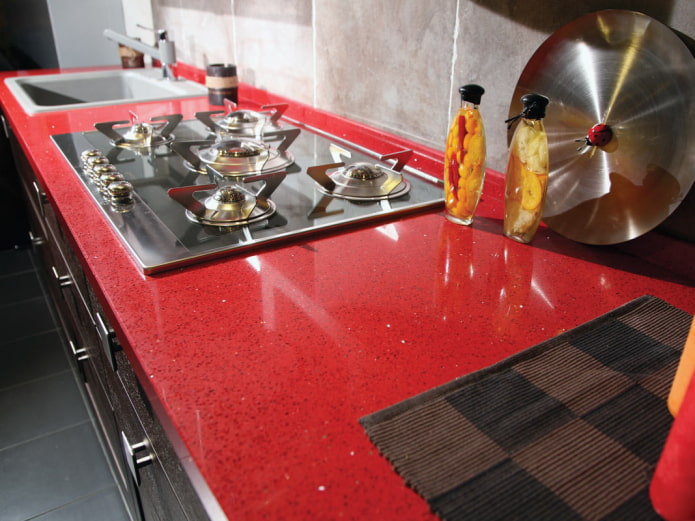
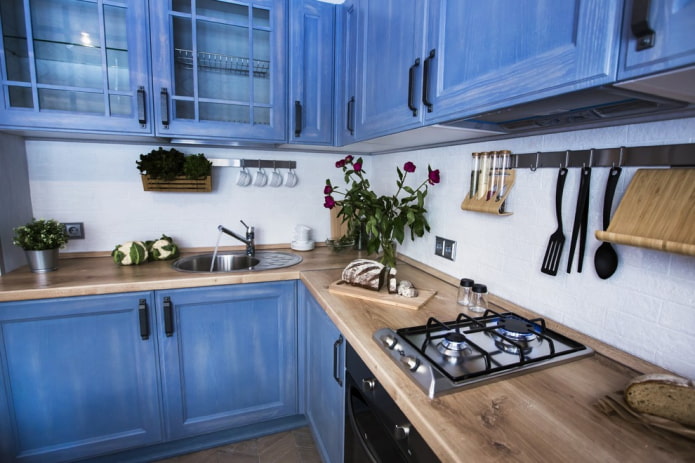
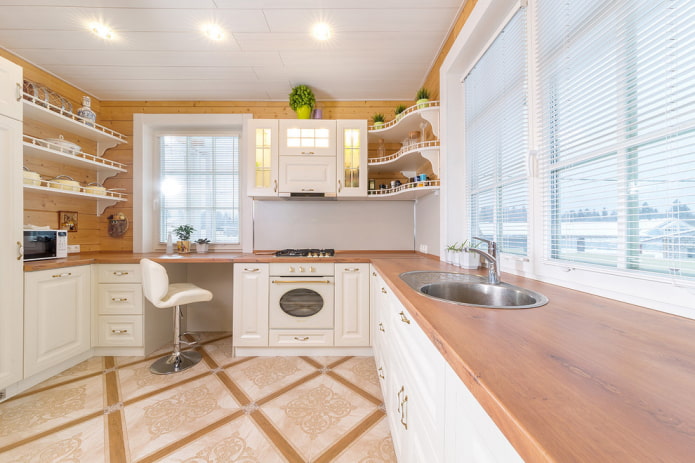
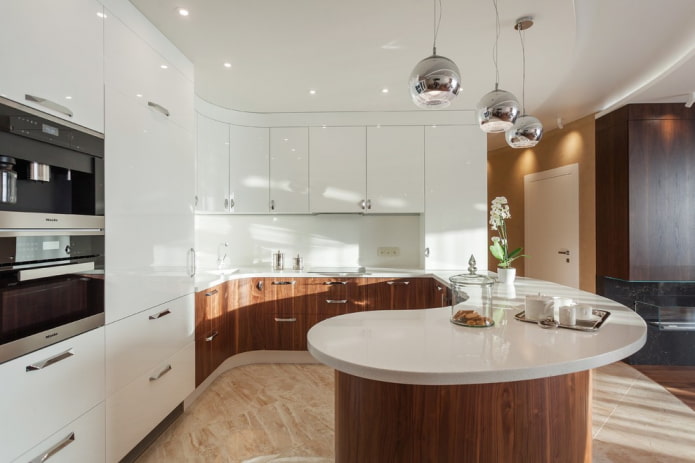
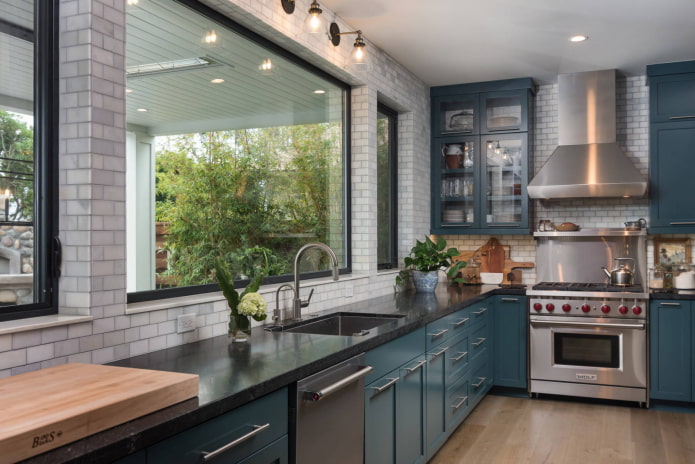
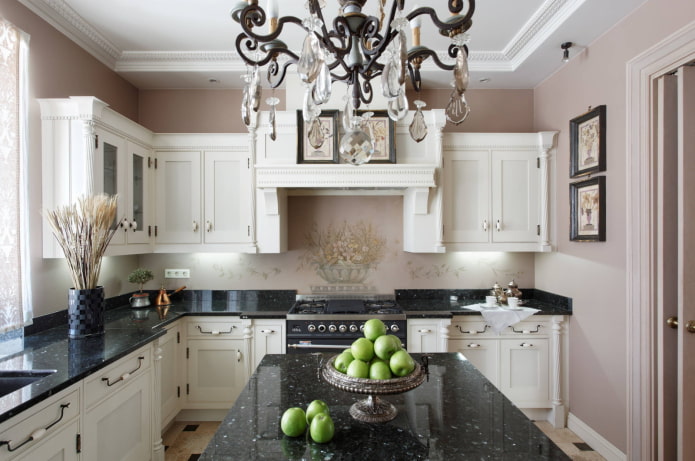
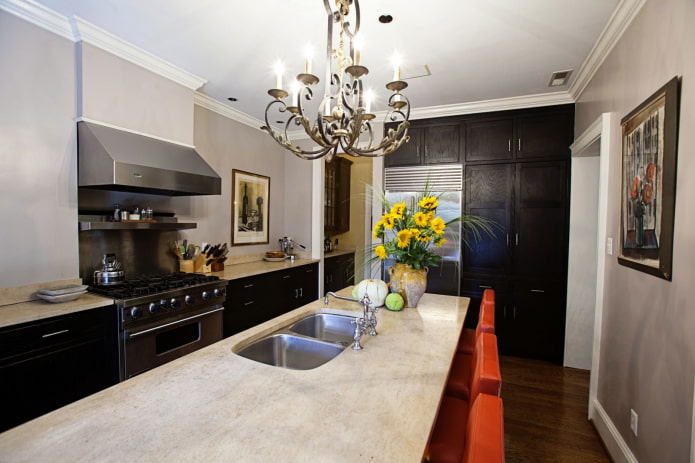
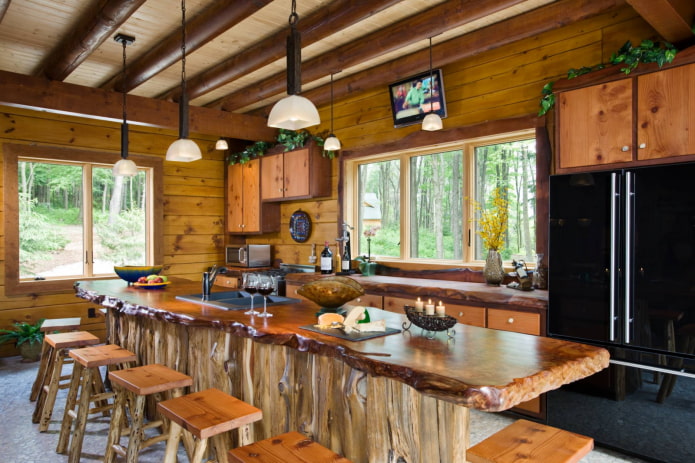
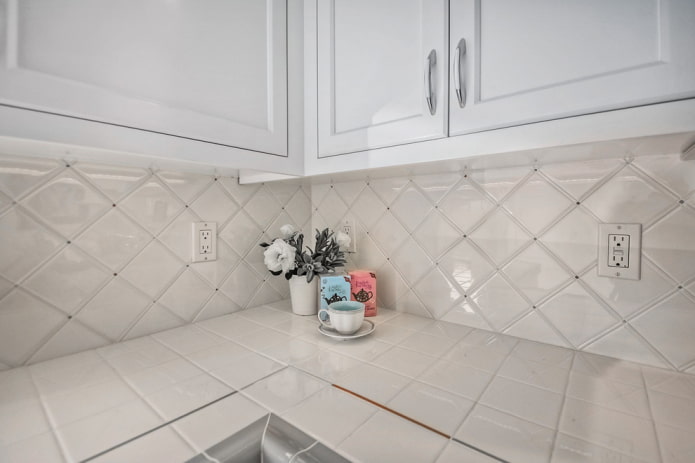
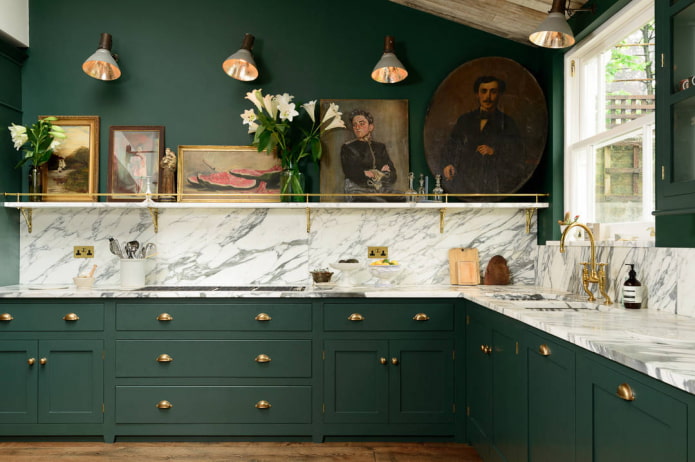
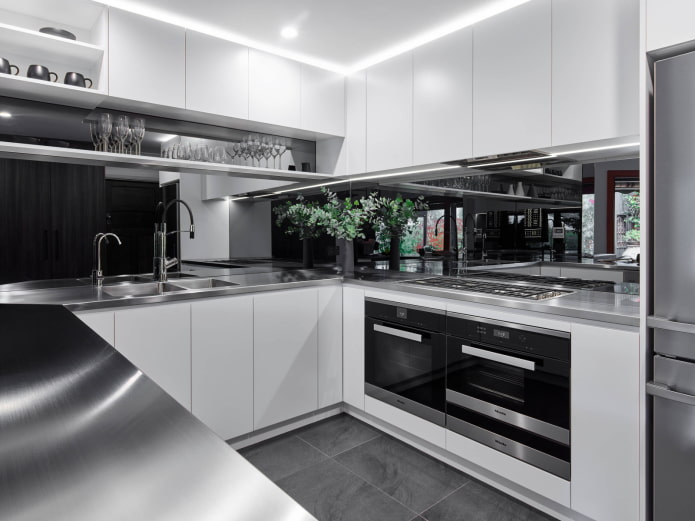
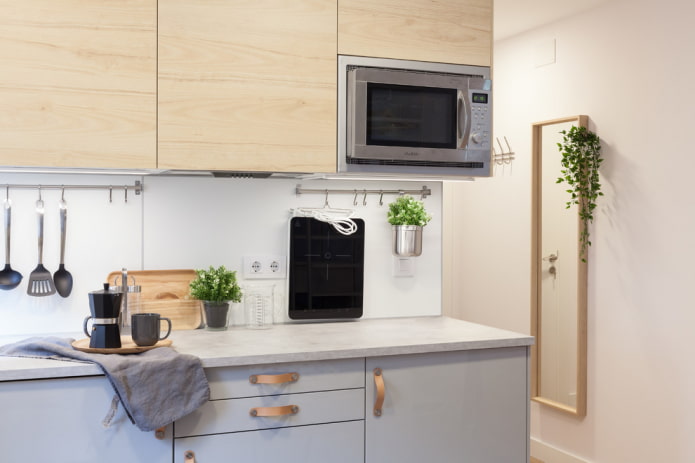
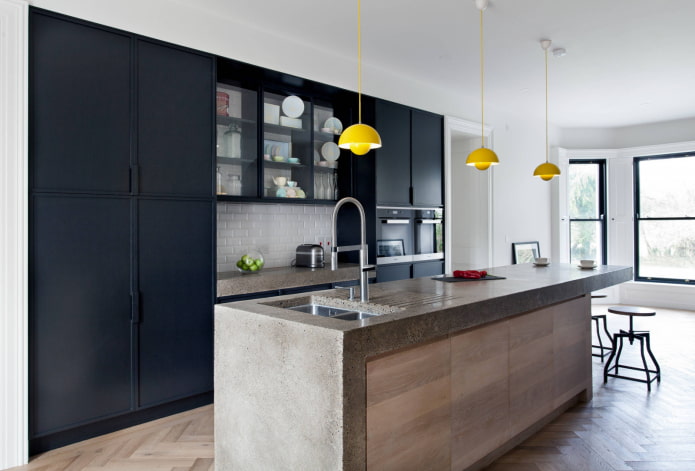
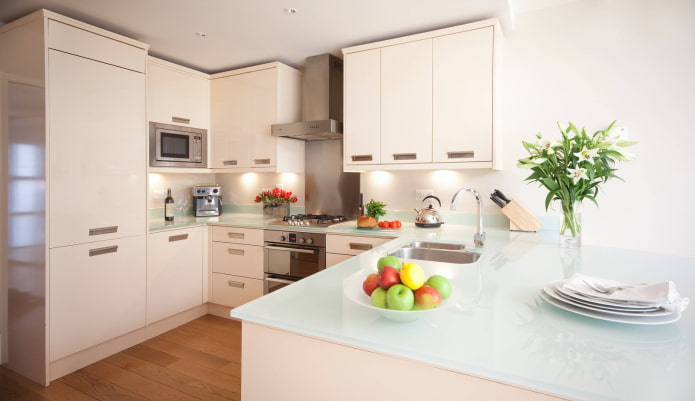
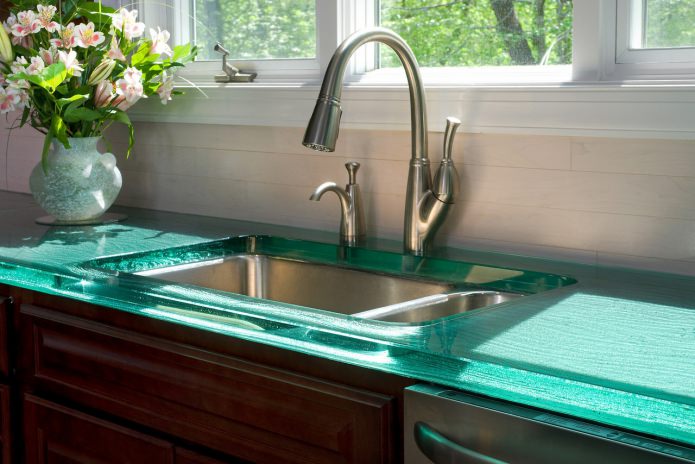
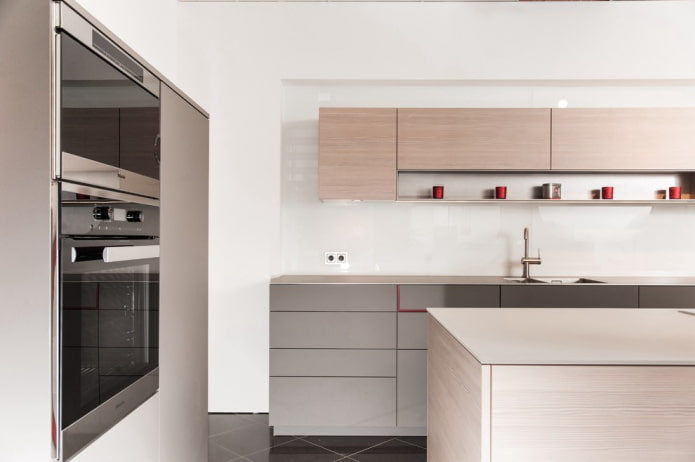
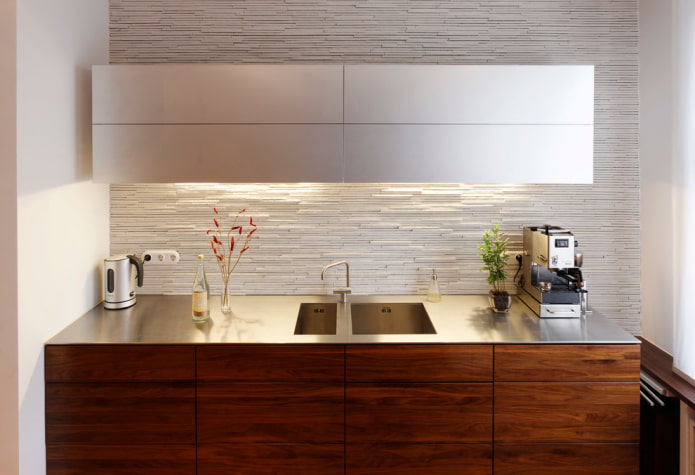
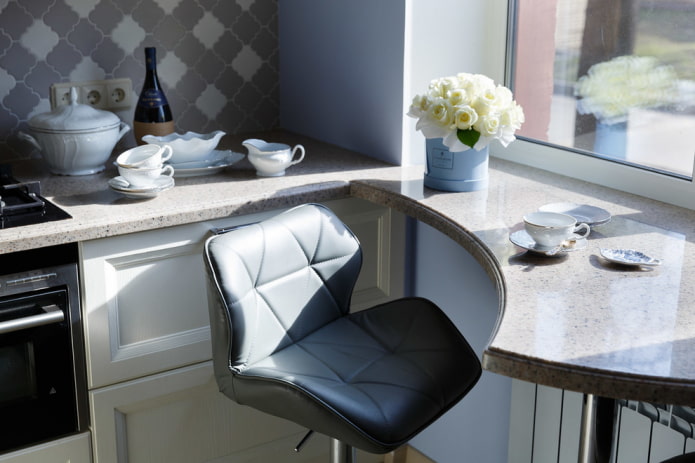
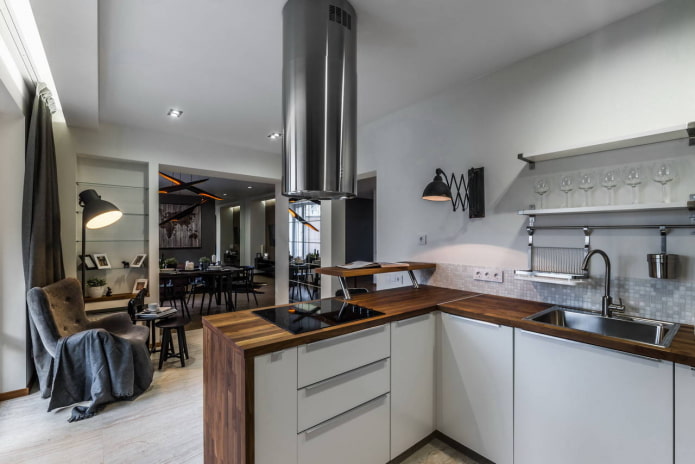
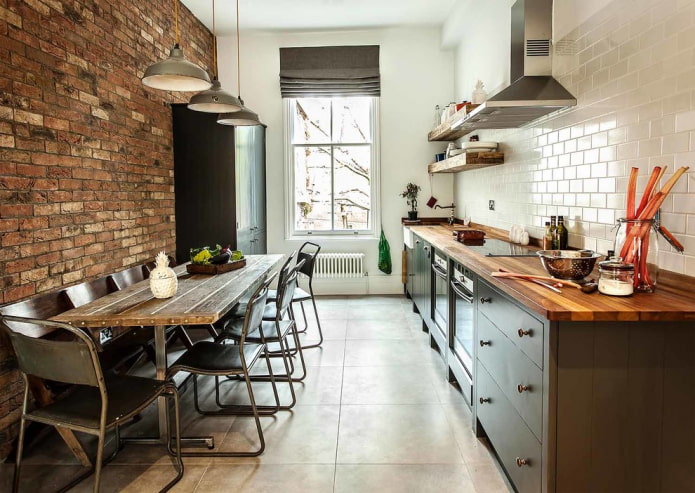
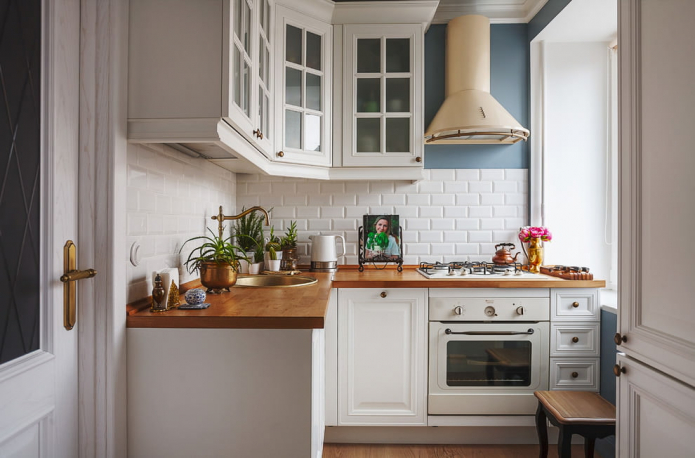
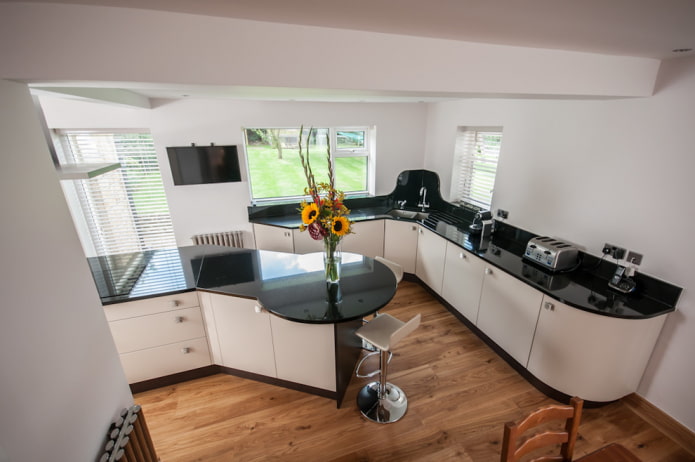
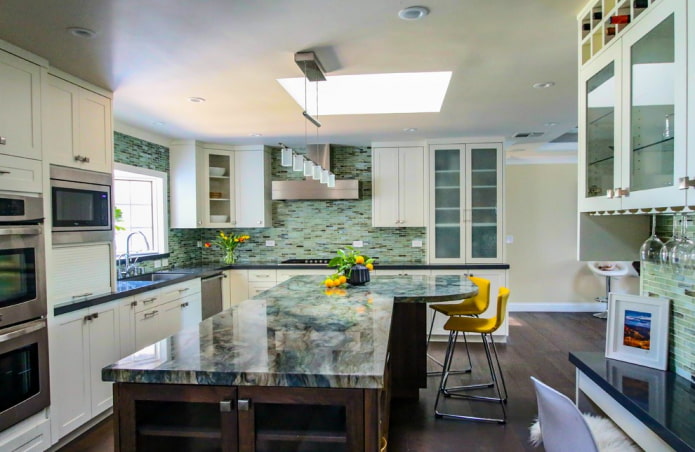
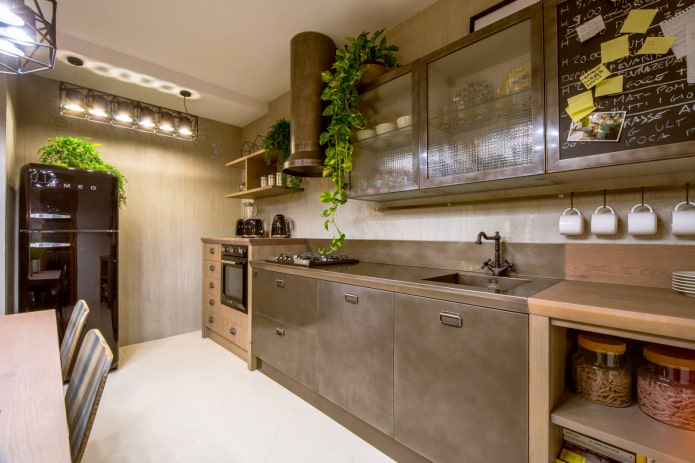
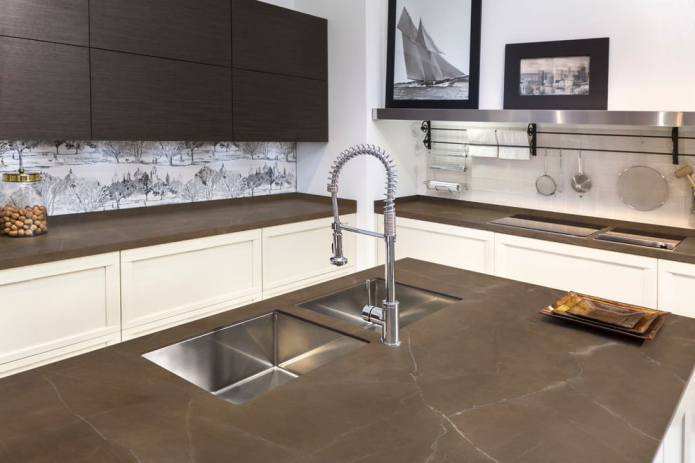
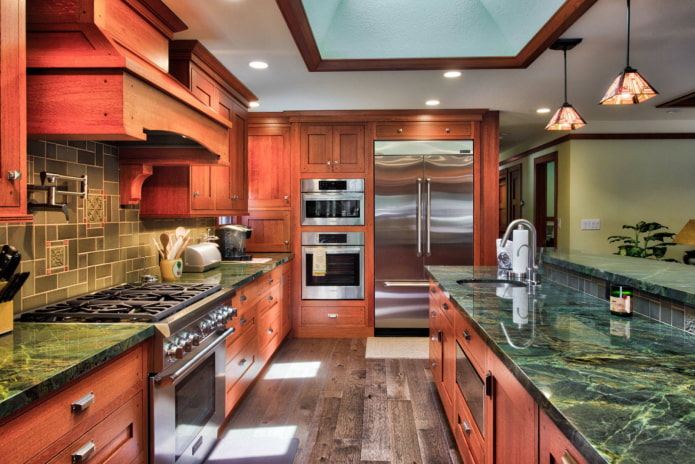
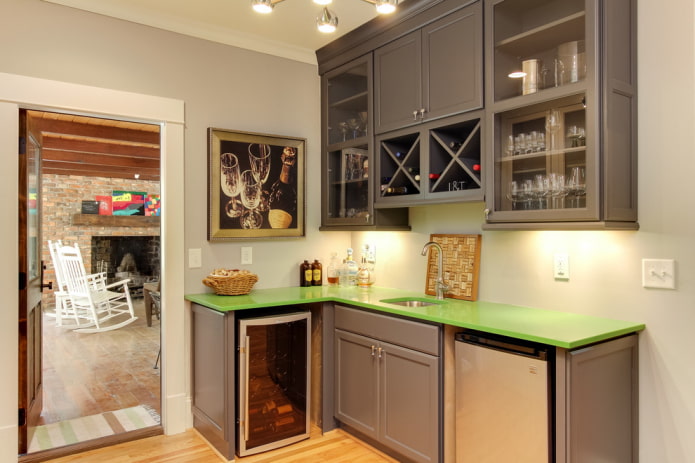
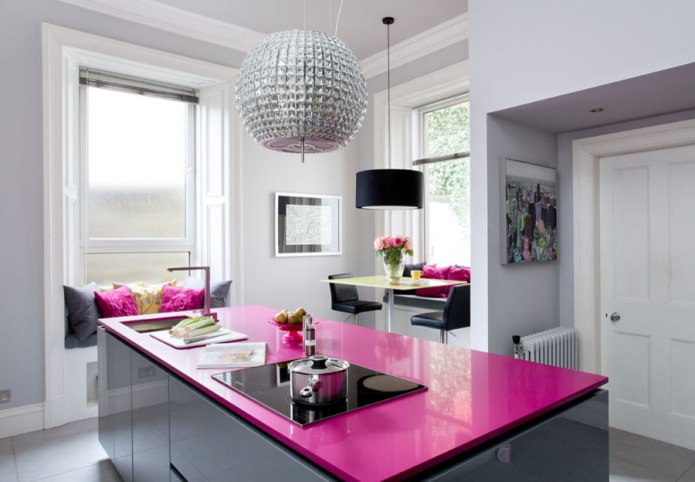
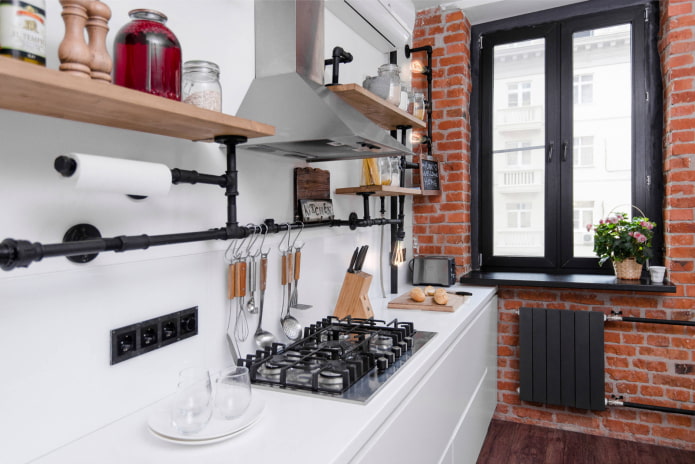
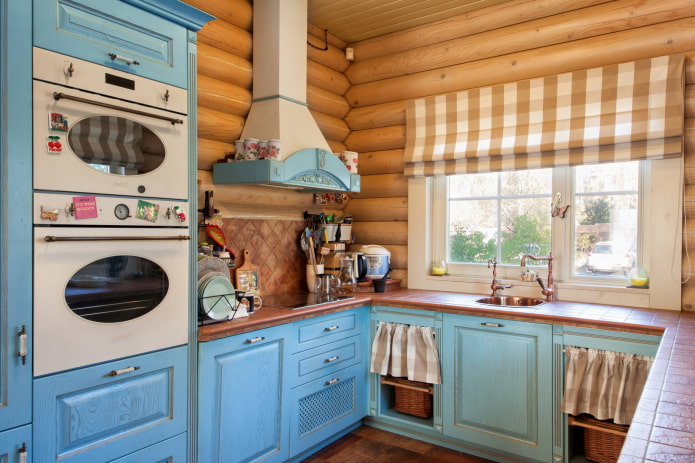
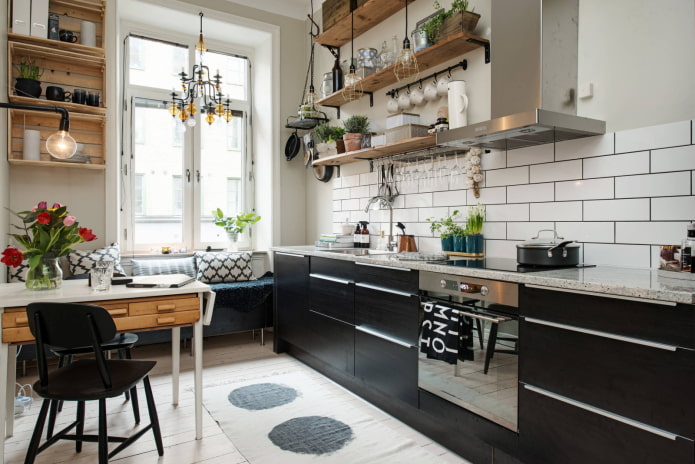
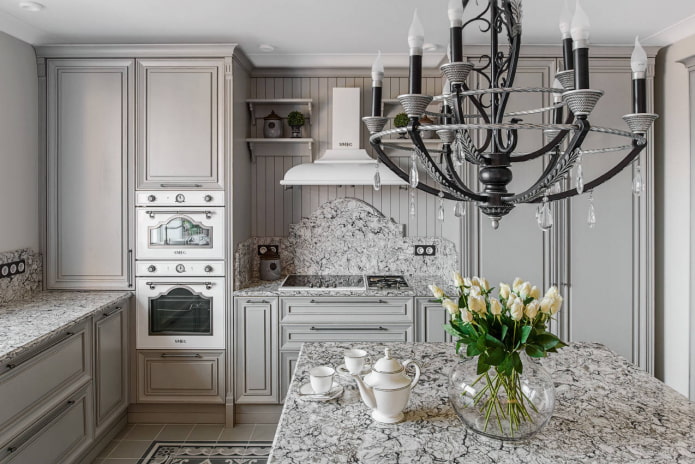
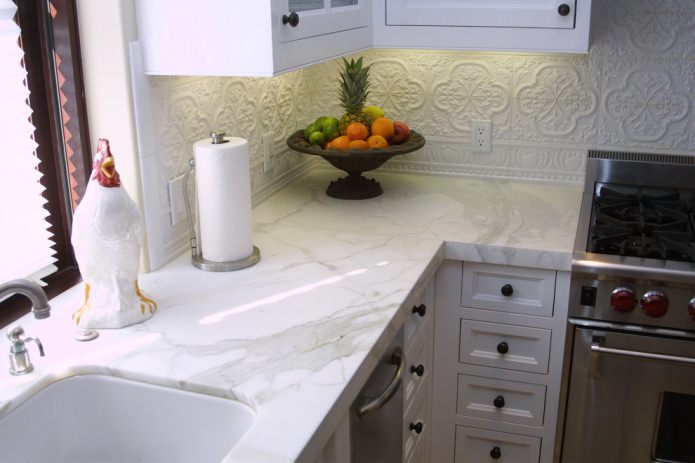
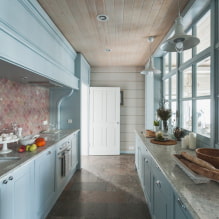
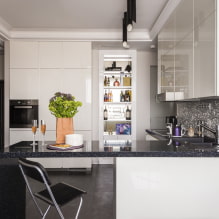
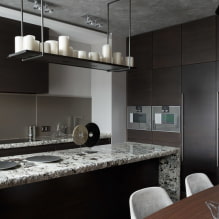
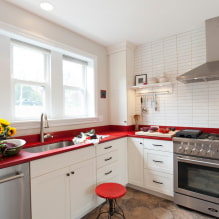
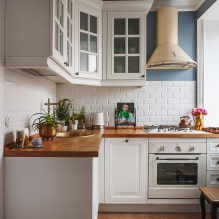
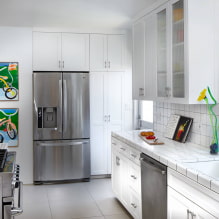
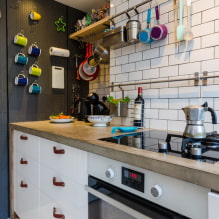
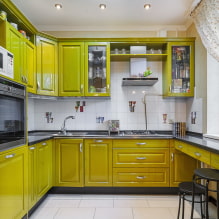
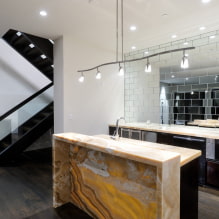

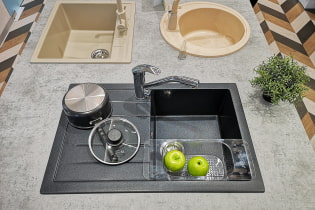 How to choose the color of the sink for the kitchen?
How to choose the color of the sink for the kitchen?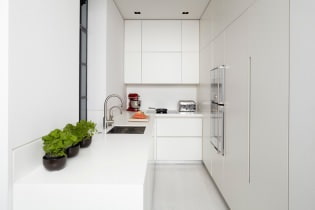 White kitchen: features of choice, combination, 70 photos in the interior
White kitchen: features of choice, combination, 70 photos in the interior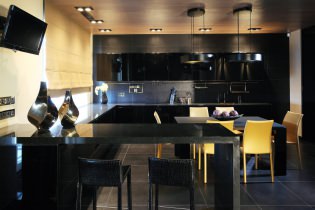 Black suite in the interior of the kitchen: design, choice of wallpaper, 90 photos
Black suite in the interior of the kitchen: design, choice of wallpaper, 90 photos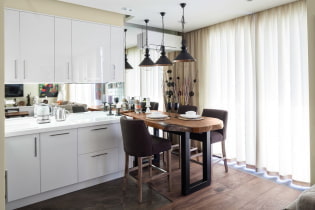 Modern design ideas for curtains for the kitchen - we make out the window stylish and practical
Modern design ideas for curtains for the kitchen - we make out the window stylish and practical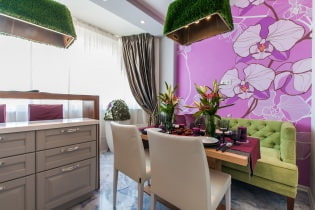 Wallpaper design: 65 photos and ideas for a modern interior
Wallpaper design: 65 photos and ideas for a modern interior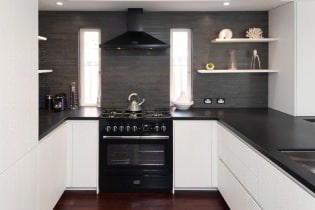 Design of a white kitchen with a black countertop: 80 best ideas, photos in the interior
Design of a white kitchen with a black countertop: 80 best ideas, photos in the interior